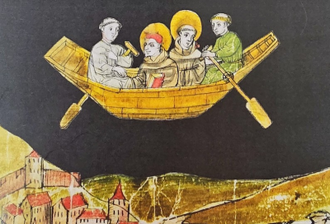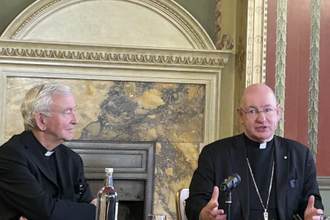Dalgan hosts 'Ireland and the Birth of Europe' exhibition

Image: Columban Missionaries Ireland
Source: Columban Missionaries Ireland
An exhibition which highlights the role played by medieval Irish scholars and missionaries, such as St Columbanus, in the early history of the European idea is currently on display in Dalgan and has been hailed by Meath County Council's Cathaoirleach, Cllr Sharon Tolan, as "very impressive".
'Ireland and the Birth of Europe Exhibition' was curated by Dr Damian Bracken of University College Cork and Dr Angela Byrne, formerly of the Department of Foreign Affairs.
It was launched last year as part of a series of events to mark 50 years since Ireland joined the EEC in 1973 and it has been touring nationally and internationally.
At the launch in Dalgan, Columban Regional Director, Fr Raymond Husband thanked Meath County Council for the honour of allowing Dalgan host the exhibition.
"Reading through the various panels it is astonishing to see the contribution and scholarship that St Columban and the early monks made to the intellectual and educational life of 5th and 6th century Europe," Fr Ray said.
"Today some elements of our society may question the valuable contributions of migrants to the social and economic development of Ireland. Reflecting on this I was struck by the words of St Columban: 'We are all joint members of one body, whether Franks or Britons or Irish or whatever our race.'"
He added: "Columban's words stand as a legacy for all of us who believe in an inclusive society where the contribution of all is welcome."
Speaking after the launch, Cllr Tolan said: "It's an amazing exhibition and one not to be missed."
She thanked the Columbans and the Association of Friends of St Columbanus in the Republic of Ireland and the Department of Foreign Affairs for facilitating it.
"I think that it is most fitting that the exhibition visits Dalgan Park - the home of the Columbans in Ireland."
Cllr Tolan also thanked the Friends of St Columbanus in Bangor and the many local authorities both north and south of the border as well as European partners who have been working together for the past number of years on the ambitious goal of creating the Columban Way, which it is hoped will be an established European cultural route.
"As many of you know, Navan is twinned with Bobbio and we look forward to deepening those connections and building new connections as we share in this rich cultural legacy," she said. "Cultural routes are important vector for the promotion and protection of cultural heritage" she explained and highlighted three core pillars of - sustainable development/environmental protection; social inclusion; and the economy.
"The Council recognises the enormous potential and impact that the Columban Way has and is committed to continue to work in partnership with the Associations, local communities, local businesses and partner local authorities on the Island of Ireland and across Europe to realise its full potential."
"The sharing of culture is the sharing of our identity. The sharing of our connection."
Historian Dr Angela Byrne told those gathered in Dalgan for the launch that "in our troubled world today the study of history is arguably more important than ever. It helps us to interrogate and understand the deep rifts of inequality and injustices. It also helps us to understand Ireland's place in wider patterns like empire - how the Irish were complicit in empire and how the Irish struggled against an empire in different places and different times. It helps to instruct and share the long story of intercultural contact and relationships between different peoples for the better and for the worse."
Describing St Columbanus' words, "we are all joint members of one body whatever our race be" as a plea for unity, she said it was as important and relevant as it could ever have been in this "age of rupture and division".
Elsewhere in her talk, Dr Byrne explained that she and co-curator, Dr Damian Bracken took as their starting point the words of French Foreign Minister, Robert Schuman, in 1950 when he suggested that Columbanus should be considered the patron saint of all those who seek a united Europe.
Schuman invoked the saint's name as he initiated the process of European integration.
When Schuman uttered those words, he was referring to the fact that in 600AD Columbanus was the first to refer in writing to 'all of Europe' when he wrote 'totius europea' in reference to the Continent's cultural identity after the collapse of the Roman Empire.
"It was a time when Europe had to rebuild and reshape itself with entirely new parameters - not unlike Europe in the post-World War II context that Robert Schuman was speaking in," she said.
She explained that the exhibition reaches back into the early medieval period to trace Ireland's role in the development of the idea of Europe and how that found expression from about 600 onwards.
Around 581AD Columbanus left Ireland for Europe with a handful of followers and from that handful of scholar missionaries they established a succession of monasteries in Annegray, Fontaine and Luxeuil in what is now France, as well as Bobbio near Genova in northern Italy.
In time Luxeuil and Bobbio grew to be major spiritual, educational and political centres renowned for their learning and for their libraries.
The exhibition runs in Dalgan until the end of national heritage week, 17th-25th August 2024.
To read on see: https://columbans.ie/dalgan-hosts-ireland-and-the-birth-of-europe-exhibition/?


















